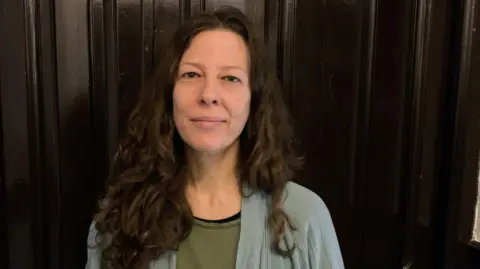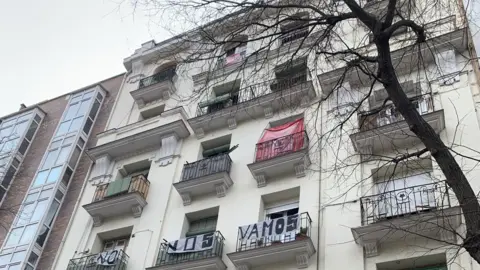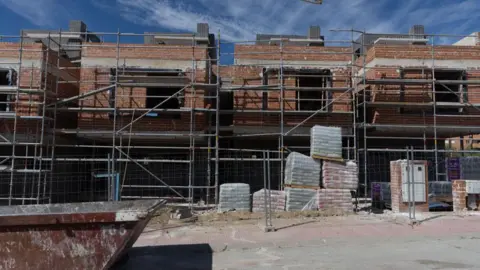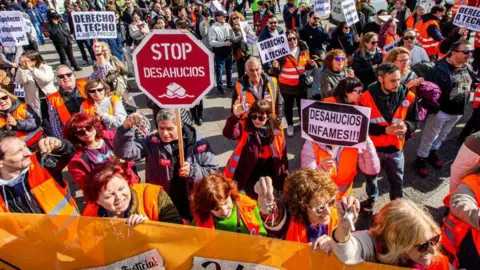Guy Hedgecoe
Business reporter
Reporting fromMadrid

 BBC
BBC
Blanca Castro, who rents an apartment in central Madrid, says she is being forced out by her landlord
Blanca Castro puts on a builder's helmet before opening the door to her kitchen. Inside it, the ceiling has a large hole that is dripping water and it looks as if it could collapse at any moment.
Because the kitchen is unusable, Blanca has to wash her dishes in the bathtub, and she has improvised a cooking area with a gas camping stove in a corner of her living room.
Many of her fellow tenants in this apartment block near Madrid's Atocha railway station have similar problems. They say the company that owns the building has stopped responding to requests for basic maintenance in recent months, since informing them that it will not renew their rental contracts.
"The current rental bubble is encouraging a lot of big owners to do what they are doing here," says Blanca. "Which is to get rid of the current tenants who have been here a long time, in order to have short-term tourist flats, or simply to hike up the rent."
Blanca and her fellow tenants have vowed to stay in the building despite what they see as efforts to push them out by the owners, who were not available for comment for this article.
The tenancy contracts last five years, during which time rent is fixed, but this area of central Madrid has seen housing costs soar in recent years.
"For another home like this [in this area], I'd have to pay double or more what I'm paying now," says Blanca. "It's not viable."
She and her neighbours are among millions of Spaniards who are suffering the consequences of a housing crisis caused by spiralling rental costs.
While salaries have increased by around 20% over the past decade, the average rental in Spain has doubled during the same period. There has been an 11% increase over the last year alone, according to figures provided by property portal Idealista, and housing has become Spaniards' biggest worry.
It's also generating anger, with Spaniards taking to the streets to demand action from the authorities to make housing more affordable. On Saturday, 5 April thousands of people are expected to protest in Madrid and dozens of other cities.


Blanca Castro says that the owner of her apartment building has stopped doing any maintenance work
A report by Spain's central bank found that nearly 40% of families who rent now spend more than 40% of their income on their accommodation.
"The current problem is a huge imbalance between supply and demand," says Juan Villén, of Idealista. "Demand is very good, the economy is growing a lot, but supply is dwindling very fast."
Mr Villén offers the example of Barcelona, where rental increases have become notorious. Whereas nine families were competing to rent each property in the city five years ago, that number has risen to 54. Rental costs during that time have increased by 60%, he adds.
"We need to build more properties," says Mr Villén. "And on the rental side we need more people willing to rent their properties, or willing to buy properties, refurbish them and put them on the rental market."
The central government has described the situation as "a social emergency" and agrees that a lack of supply is driving the crisis. Last year, the Housing Ministry estimated that the country needs between 600,000 and one million new homes over the next four years in order to meet demand.
This need for more housing has been pushed up in part by the arrival of immigrants who have joined the workforce and are helping drive Spain's economic growth. The ministry also pointed to a lack of social housing, which at 3.4% of total supply, is among the lowest in Europe.
In 2007, at the height of a property-ownership bubble, more than 600,000 homes were built in Spain. But high building costs, lack of available land and a shortage of manpower have all been factors in restricting construction in recent years, with just under 100,000 homes completed in 2024.
The government has taken measures to incentivise construction, apportioning land for the building of affordable homes, while trying to ensure that public housing does not end up in the private market, which has been a problem in the past.

 Getty Images
Getty Images
The Spanish government says that new homes are needed to keep up with demand
But the Socialist prime minister, Pedro Sánchez, has also expressed a willingness to intervene in the market in order to bring rental prices under control.
At a recent event to mark the opening of 218 low-rent flats in the southern city of Seville, he declared that Spaniards "want us to act, they want the housing market to operate according to the law of reason, of social justice, not the law of the jungle; they want to ensure that vulture funds and speculators are not doing whatever they like".
The central government and a number of local administrations have identified short-term tourist accommodation as part of the problem. Last year, the Canary Islands, the Balearic Islands and several cities on the mainland saw protests by locals against surging tourist numbers, with their impact on rental costs the main complaint.
Several city halls have responded by announcing plans to restrict the granting of tourist-flat permits, while Barcelona is going further, revoking the licences of all of the city's 10,000 or so registered short-term apartments by 2028.
The Sánchez government has also pushed through parliament a housing law, which includes a cap on rentals in so-called "high-tension" areas where prices are climbing out of control. Political resistance has meant that the legislation is so far only being implemented in the northern regions of the Basque Country, Navarre and Catalonia, and its success is open to debate.
The Socialist-led regional and central governments have pointed to a 3.7% drop in rental costs in "high-tension" areas of Catalonia since the cap's introduction there a year ago, with Barcelona seeing a decrease of 6.4%.
However, critics warn that the rental cap has spooked owners and caused thousands of properties to be withdrawn from the market.

 Getty Images
Getty Images
Protests have taken place in Spain this year against high rental prices and home evictions
"On the supply side, the problem is that all measures taken by the local or national governments are going against landlords," says Mr Villén. "Even people that were doing build-to-rent new properties have been selling their properties because they don't want to get into the rental market."
Another initiative proposed by the central government which has stirred up debate is a tax of up to 100% on properties bought by non-residents from outside the EU, on the grounds that such homes are often barely inhabited. This is a measure that, if rolled out, would heavily affect British buyers.
The conservative opposition has accused the government of being too heavy-handed with its approach. However, as public anger builds over this issue, there are many others who would like the country's leaders to act much more stridently.
Gonzalo Álvarez, of the Sindicato de Inquilinas e Inquilinos, an organisation that campaigns for tenants' rights, agrees that a shortage of available homes is a problem, but insists that building more is not the answer.
"There is a lack of housing because homes are being hijacked - on the one hand tourist flats, and on the other hand all the empty flats belonging to vulture funds and the banks," he says. "So there's no need to build more, it's not necessary. But the housing we have has been hijacked."
His organisation wants the government to impose drastic mandatory reductions in rent on owners and is threatening to orchestrate a nationwide strike by tenants that would see participants refuse to pay their rent.
"The [central and local] governments are not setting any limits," says Mr Álvarez. "So who is going to? We will have to do it."
Read more global business stories

 5 hours ago
3
5 hours ago
3









 English (US) ·
English (US) ·